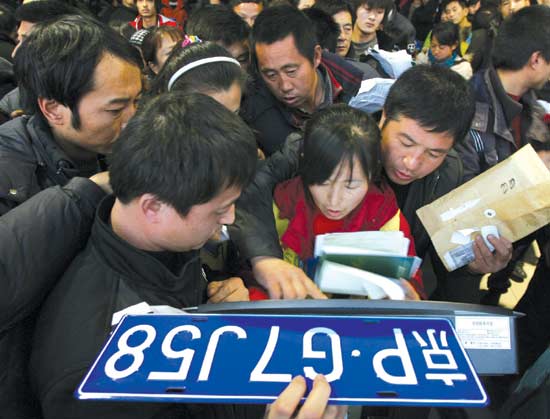Top News
Car curbs may not have traction
Updated: 2010-12-31 13:48
By Yang Yang (China Daily European Weekly)
Doubt and debate have spread across China's capital following the introduction of strict new traffic measures to solve one of the world's worst gridlocks.
The Beijing government on Dec 23 announced that only 240,000 vehicle registrations will be issued in 2011, down from a record 700,000 registrations in 2010.
From April 1, parking fees in the city area will jump from 2 yuan (0.228 euros) to 10 yuan (1.14 euros) per hour and cars registered outside of Beijing will be banned from the city during rush hours.
|
 Residents crowd a ticket counter at a vehicle trading market in Southern Beijing to obtain car number three days before the local government announced rules to restrict new vehicle registration on December 23. [China Daily] |
With its expanding subway network, Beijing is also aiming for 50 percent of commuters using public transportation.
But limiting new vehicle registrations is only a temporary measure, said Niu Fengrui, a researcher with the Institute for Urban and Environmental Studies at the Chinese Academy of Social Sciences.
"It is impractical to expect too much from the new traffic measures," Niu says. "It is only delaying the day when Beijing's car numbers reach 5 million and it's unlikely to stop the growth."
From May, 2007 to the start of 2010, more than 1 million cars were added to Beijing streets, a record number for any modern Asian city. In contrast, Tokyo spent 12 years achieving the same growth.
The Chinese capital currently has 4.76 million vehicles and the latest traffic regulation announcement has sparked a buying frenzy.
Car dealers in Beijing opened until midnight and one Volkswagen outlet received 600 orders in one day, almost the same orders they would normally receive in an entire year, the Beijing News newspaper reported.
In November alone, nearly 96,000 cars were sold in Beijing, 33 percent up over the same period of 2009.
A global survey conducted this year by IBM said Beijing is tied with Mexico City for the world's worst commute.
Many other Chinese cities, which are closely monitoring Beijing's traffic management plan, are also experiencing the same traffic woes, which are affecting their economies.
The Chinese Academy of Sciences' sustainable development department estimated that traffic jams cost 15 Chinese cities including Beijing and Shanghai more than 1 billion yuan (114.3 million euros) each day.
"When I need to drive to some place during work, I will first check whether there are many cars choking on the ring roads. I will just give up less important things if there are," said Luo Jintao, a 36-year-old IT worker.
One Beijing-based national newspaper, the Guangming Daily, predicted car numbers could reach 7 million by 2014. Without proper measures, the average speed of vehicles will be lower than 15 km per hour, almost the same as bicycles, the newspaper said.
Zhang Changqing, director of the transportation law institute at Beijing Jiaotong University, said an efficient public transport system was the best way to fix traffic jams.
"Without it, Beijing will still be choked off even if they stop issuing license plates at all," Zhang said.
He said the growth of car ownership in Beijing had been underestimated, and as a result, traffic planning had not kept pace with urban development.
On Dec 30, Beijing's subway network length reached 300 kilometers after five new subway lines were opened. By 2015 this will hit 561 km and grow to more than 1,000 km by 2020.
Under the new rules, people with cars registered outside Beijing will be banned from entering the city during rush hour.
Fifty-six-year-old Zhang Jianguo, who makes frequent trips to Beijing from Hebei province for his wine business, has asked his daughter, who has a Beijing hukou (household registration), to line up for the first license-plate lottery on Jan 26.
As for raising parking fees, Zhang Changqing from Beijing Jiaotong University, said its effect will be minimal. "I don't think it will cause problems for BMW or Mercedez-Benz owners," he said.
Beijing's new traffic control measures have drawn the attention of other mega cities.
Guangzhou, capital of South China's Guangdong province with a population of more than 14 million, has been confronted with severe traffic jams since the end of the Asian Games.
The city is considering re-introducing an odd and even license plate rule after the Asian Games to unsnarl traffic.
However, some political advisers have urged Guangzhou's government to learn from Beijing's experience and limit vehicle registrations.
"The odd-even plan will encourage some owners to buy a second car," local political adviser Han Zhipeng said. "So it's necessary to introduce a long-term measure like Beijing's."
There was a rise in the number of new car registrations in the city following the Nov 1 adoption of the odd-even license plate restriction.
More than 2,000 vehicles were registered daily during the Games, while an average of about 1,200 were registered daily throughout 2010.
However, Guangzhou does not plan to introduce a vehicle registration limit similar to Beijing's, Guangzhou communication commission director Xian Weixiong said.
"Instead, we will optimize the traffic network and enhance the development of public transportation through such means as building more metro lines in coming years," he said.
E-paper

Ear We Go
China and the world set to embrace the merciful, peaceful year of rabbit
Preview of the coming issue
Carrefour finds the going tough in China
Maid to Order
Specials

Mysteries written in blood
Historical records and Caucasian features of locals suggest link with Roman Empire.

Winning Charm
Coastal Yantai banks on little things that matter to grow

New rules to hit property market
The State Council launched a new round of measures to rein in property prices.
